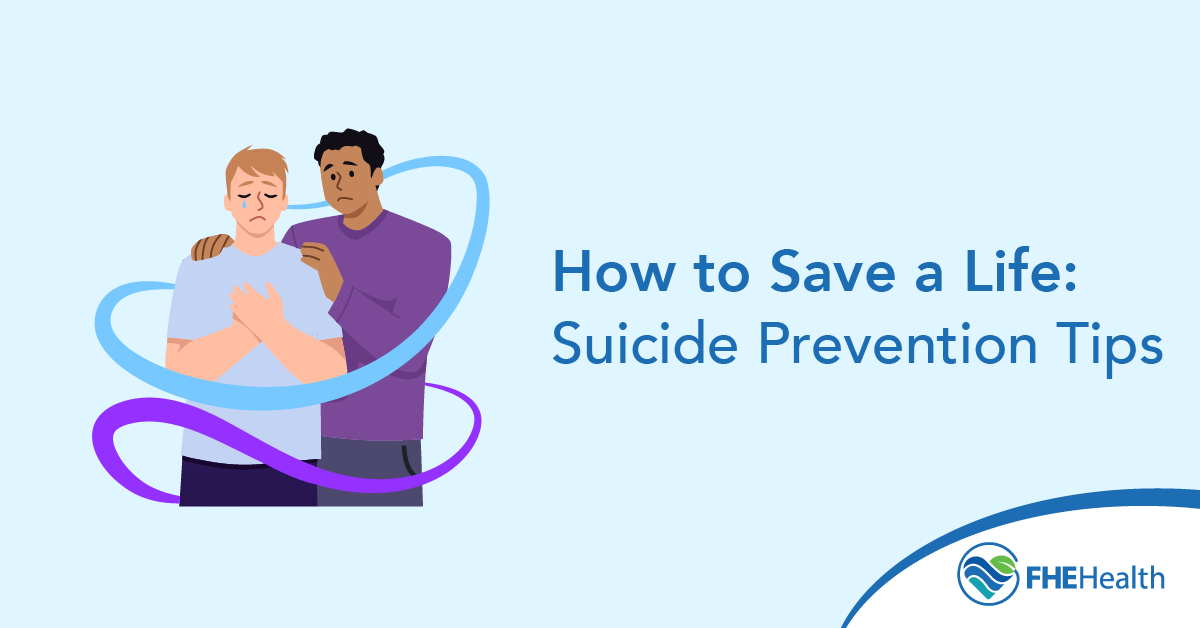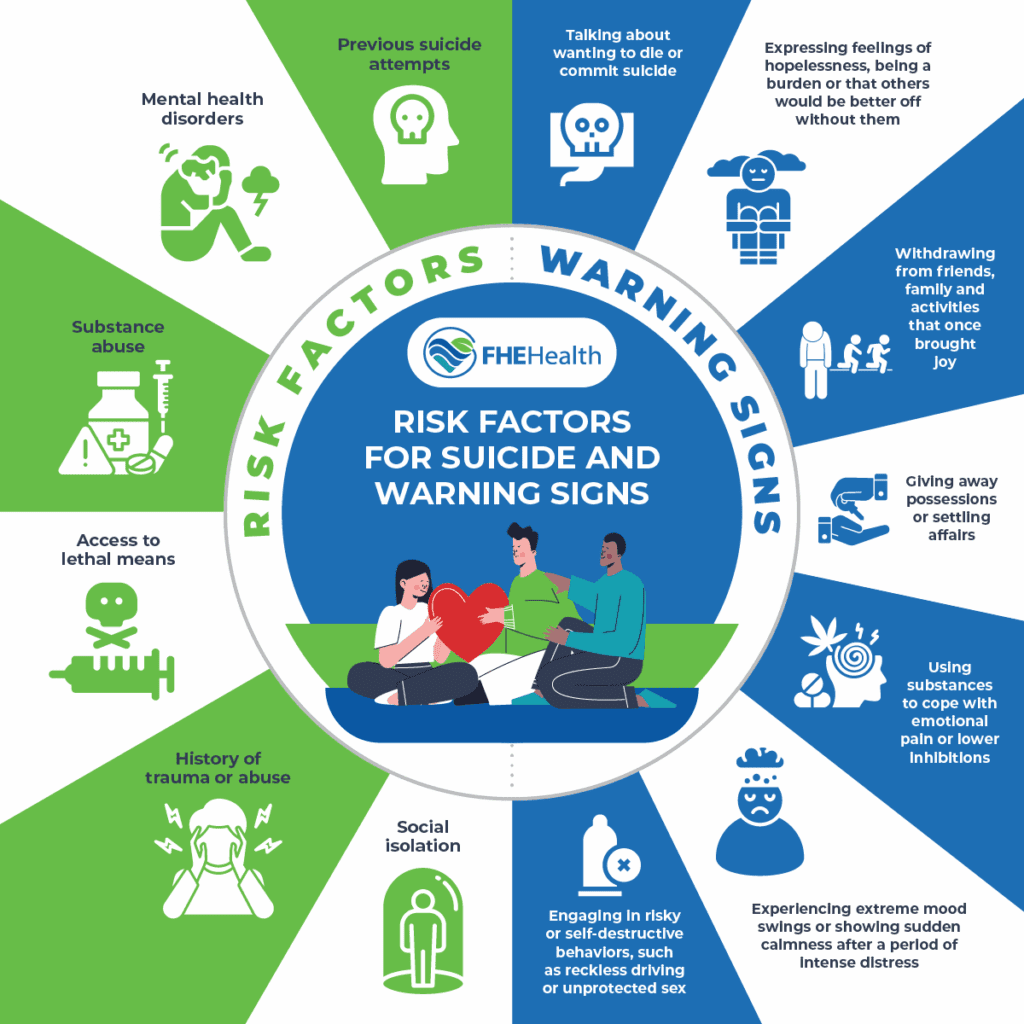
Knowing the facts about suicide prevention can save lives. After all, 12.8 million people seriously considered suicide in 2023 alone. Understanding how to help someone who’s suicidal ensures you’re ready to respond when someone you care about needs help.
Suicide Prevention Crisis Hotlines and Emergency Resources
When a loved one is in crisis, emergency help is necessary. A suicidal crisis is different from simply having suicidal thoughts. Someone experiencing a crisis is about to harm themselves or is seriously planning to try. Experts refer to this as “suicidal intent.”
In a crisis situation, call, text or chat with the National Suicide and Crisis Lifeline at 988. Because someone in the United States attempts suicide every 11 minutes, the hotline has help available 24-7. A mental health professional will respond and provide you with crisis support.
If a loved one has just attempted suicide, text or call 911 or your local emergency response number. First responders will answer your request for help and provide emergency medical assistance.
Recognizing When Someone May Be at Risk
Many people go through periods of suicidal thinking before reaching a crisis point. Although everyone’s experience is unique, individuals who have suicidal thoughts may display warning signs. Common warning signs in adults include:
- Appearing anxious, agitated or enraged
- Experiencing changes in sleep, such as oversleeping or insomnia
- Describing feelings of being trapped or in unbearable pain
- Discussing suicide or self-harm
- Engaging in reckless behavior
- Experiencing extreme mood swings
- Expressing fears or worries about being a burden to other people
- Fantasizing about seeking revenge
- Having a chronic health condition or mental illness
- Engaging in new or increased drug or alcohol use
- Saying they feel hopeless or don’t have a reason to live
- Withdrawing from others or saying they feel isolated from others
In children and teens, warning signs of suicidal thinking are often different. They may include:
- Believing there’s little to no hope for the future
- Having changes in sleep, such as oversleeping or insomnia
- Experiencing overwhelming emotional distress
- Experiencing new or increased agitation or irritability
- Developing new or worsening headaches, stomachaches or fatigue
- Withdrawing from social situations and connections
- Seeming angrier or more hostile than usual

How to Start the Conversation About Suicide
The above warning signs can indicate that a person may be struggling with suicidal thoughts. However, a person who displays just one or two signs may not actually be at risk. That’s why it’s important to talk to the person and share your concerns.
Starting a positive conversation is a key step in suicide prevention. Here are some tips to help you begin.
1. Choose the Right Time and Location
Your loved one is more likely to respond well when they feel relaxed. Wait until they appear calm to start talking. To encourage them to open up, choose a private setting.
When possible, have the conversation face-to-face. Talking in person reduces the risk of miscommunications that can occur when texting. A video chat app can be a good substitute. If a visual option isn’t available, try a phone call.
2. Lead With a Specific “I Statement”
Focusing on yourself in your conversation starter can help your loved one feel more at ease. Say what you’ve noticed, observed or felt that led you to talk. Possible openers include:
- “I saw what you posted on Instagram…”
- “I’ve noticed you haven’t been yourself…”
- “I’ve been worried about you lately…”
- “I’ve been thinking about you a lot…”
- “I feel like maybe you’ve been struggling recently…”
3. Ask a Direct Question
After making your “I statement,” ask a direct question of your loved one to open up the conversation. Feel free to bring up suicide or self-harm if you feel comfortable. Sample questions include:
- “Is everything okay with you?”
- “Can we talk about what’s bothering you?”
- “Do you want to talk?”
- “Are you thinking about suicide?”
- “Have you been thinking about suicide?”
4. Use Proper Terminology
Avoid using slang terms for suicide, such as “unalive yourself” or “off yourself.” These casual terms may minimize what your loved one is feeling. Or, they may come across as dismissive or flippant.
5. Give Them Room to Speak
Once you’ve asked your introductory question, stay quiet and let your loved one speak. Show you’re listening by nodding. If they pause or hesitate, try saying something like “Keep going, I’m listening” or “Please tell me more.”
While your loved one talks, avoid interrupting. Listen carefully to what they say. Try not to start thinking about your response until they’ve finished. It’s okay to take a moment to collect yourself before continuing the conversation.
6. Ask Follow-Up Questions
Encourage your loved one to keep talking by asking questions such as:
- How long have you been feeling this way?
- Have you tried to hurt yourself?
- Have you had these thoughts or feelings before?
- Have you told anyone else about this?
- How can I support you right now?
Steps You Can Take to Provide Immediate Support
To support your loved one during this crucial time, follow these tips.
- Offer to Help
Ask your loved one if you can help. Let them know you’re here for them. Offer to listen or spend time with them. - Reassure Them
Tell your loved one they matter to you. Reassure them that they aren’t a burden. Describe some of the ways they make your life better. - Build a Community of Awareness and Support
Ask your loved one for permission to let other trusted people know about the situation. A strong support network of family and friends can make a big difference. - Encourage Them to Seek Professional Support
The reality is that learning how to stop suicidal thoughts on your own is unlikely. Fortunately, mental health professionals can help your loved one.
As many as 90% of people who experience suicidal thoughts have a mental health disorder. A mental health professional can diagnose your loved one and develop a treatment plan. Treatment can reduce their risk of suicide and help them lead a happier, healthier life.
Point out the benefits of treatment to your loved one. Offer to help them find a professional to talk to. You can even accompany them to the office or clinic, if they wish.
Connect Loved Ones to Professional Help
If you’ve observed warning signs of suicidal thinking in a loved one, help is available. The team at FHE Health is ready to assist. Contact us now and connect your loved one to caring, experienced professional help.






